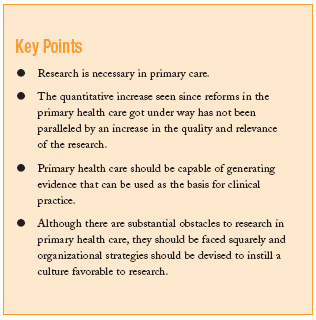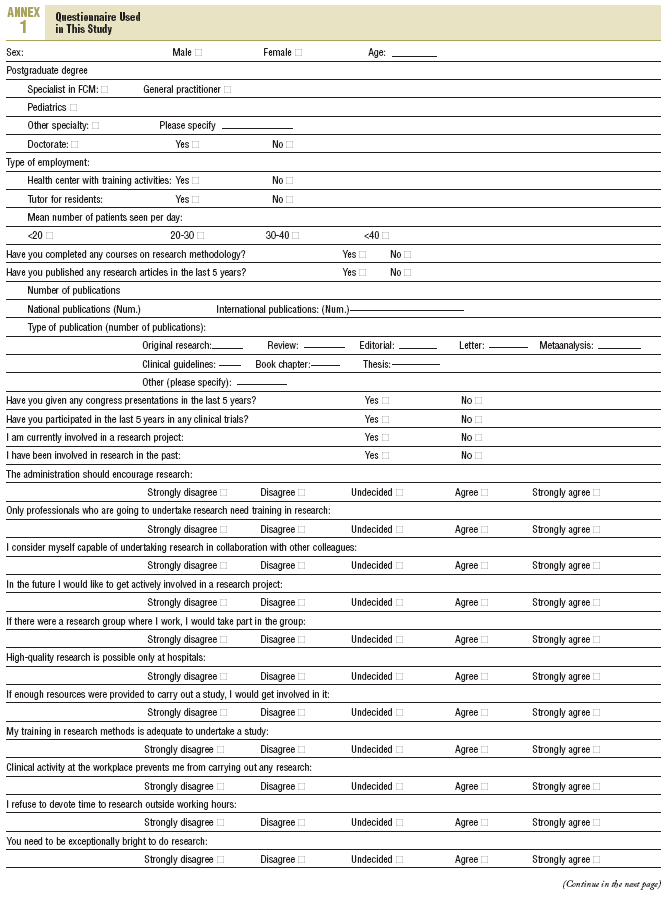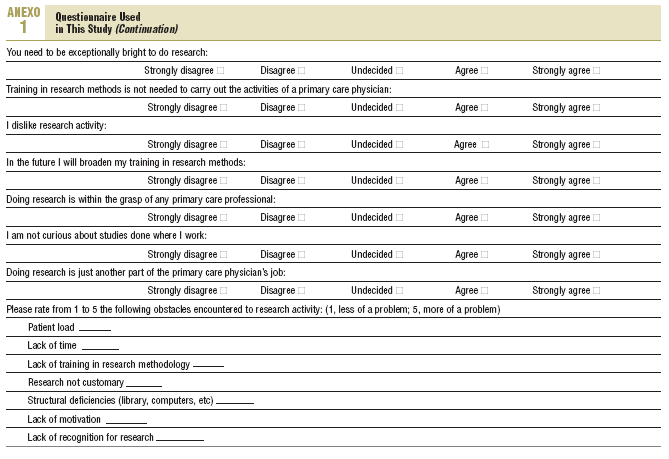Research is necessary for progress in all areas of medicine, including primary health care (PHC). Since the reforms in the Spanish PHC system got under way, there have been repeated calls from many sectors to foment research in PHC. Since the 1980s, when research was so meager as to be all but nonexistent, the number of publications and congress presentations from authors at health centers and other PHC professionals has increased considerably.1,2 However, it is still worthwhile to examine whether the increase in quantity has been accompanied by an increase in the quality and relevance of research. Although these aspects have shown some improvement, this has probably been insufficient to fulfill initial expectations. Most such research has been purely descriptive, has been performed in isolation, and has been limited in many cases to the replication of other studies.
As a result we are still far from attaining a degree of research development that reflects the importance of PHC within the health care system.
There is increasing talk of basing our practice work on scientific evidence, but rarely do we have the evidence we need. Much of the research done is of limited generalizability and the results cannot always be extrapolated very far, and as a result we lack information on such basic things as the frequency of many health problems in the community, the usefulness of diagnostic tests in our setting, or the efficacy of treatments in the population and the conditions under which these treatments are generally used.
If we all agree that we need this information, why do we continue to base our decisions and recommendations on research done in other levels of health care and under circumstances that differ markedly from those that typify our usual practice? Why haven't we been able to generate the information we need, in our own setting, with our own patients and under actual conditions of practice, so that we can use this information in our decision-making processes and to develop the recommendations and clinical guidelines we follow? Why haven't we been doing more, better research? Why are studies that examine the real information needs of PHC professionals so scarce?
If we truly wish to help improve the health and well-being in the population we serve, we must surely have at our disposal the right information to make the best decisions for our patients, and for improving the quality and efficiency of the care we provide. This information should come from methodologically sound research aimed at issues of interest, and that provides results we can extrapolate to professional practice in PHC. We should not resign ourselves to reliance on information generated by studies from other health care settings and done under conditions that can hardly be considered applicable to our own practice. Instead, we should commit to facing the challenge of performing high-quality research on the main health problems in the population we serve and on the different manners in which these problems can be managed. This research should be oriented pragmatically so that the results can be applied to daily practice in PHC. It should not be forgotten that society demands that health care resources be used as efficiently as possible to allow optimization, sustainability and equity in the national health system.
There are, to be sure, substantial obstacles to the development of research in PHC, but there are also advantages.3 Primary health care offers a magnificent opportunity to do research, as it is at this level where the most prevalent diseases are managed in their earliest stages, and where most of the motives for consulting are successfully handled. Furthermore, the longitudinal nature of primary care, its ability to reach the entire population, and the fact that the family and community context is involved all make PHC the most appropriate level for research into a multitude of health problems. However, increasing patient loads mean that less and less time is left for other types of activity, to say nothing of research.
This is why the publication of studies that aim to analyze professionals' attitudes toward research is good news. Studies such as the one, although done within the limited setting of a single health care area in Madrid, call attention to the problem and offer data that may help deal with some problems, or at least improve the situation.
On the subject is research, one important issue that arises is the best way to measure research activity in PHC. The usual process is to count publications and congress presentations but to ignore their quality or relevance. In many cases these communications do not even report on actual research. Considering quantity over quality and relevance often has the opposite effect to the desired one, since it actually creates incentives to perform small, straightforward studies that can be completed in little time and that are often carried out at a single center, instead of fomenting rigorous multicenter studies broad enough in scope to provide reliable data that will help answer relevant questions.
Some findings reported by Cevallos García and colleagues merit commentary. The low response rate appears to reflect a certain lack of interest in the topic on the part of professionals. Although the figure may be considered acceptable and customary for this type of study, it nonetheless biases the results, which probably overestimated the degree of primary care physicians' interest in research. In addition, the mean score for physicians who responded was 53 points out of a maximum of 80; although the authors considered this "acceptable" and similar to the score reported in an earlier study with the same instrument, it could be considered insufficient, particularly if we consider the likely positive bias that resulted from the low response rate. Moreover, this mean score did not vary significantly with a number of other characteristics of the respondents. Should we therefore consider Spanish primary care professionals to be apathetic in general about research? This would be painful to admit, and we should hope that it is not the case.
The results regarding obstacles to research in primary care identified are common difficulties:4 large patient loads, lack of time, structural deficiencies, lack of training, etc. These are, to be sure, important obstacles, but we should ask ourselves whether they reflect, in many cases, excuses rather than truly insurmountable difficulties. We should squarely face these problems and admit that promoting research should not be limited to running methodology courses, but should also comprise the design and implementation of organizational strategies aimed at fomenting and implanting a culture favorable to research among PHC professionals. Efforts are needed to promote research activities and disseminate their achievements, through actions such as recognition for research, time set aside specifically for research activities, and recognition for researchers. Also needed are research infrastructure and support units, training and enabling plans that facilitate exchanges between professionals, the creation of stable research groups and networks that collaborate with other levels of health care, and collaboration with universities at all levels. In this connection, administrative recognition for research activities is fundamental. Managers should not see research as a luxury or an "extra" for some professionals, but as a necessity that will lead to improvements in the quality and efficiency of the system, and that should thus be fomented and rewarded. Although promising initiatives are already under way, there is still a long road ahead. It is to be hoped that with everyone's efforts and cooperation, we will soon be able to speak of research as an achievement in the present rather than a hope for the future.













